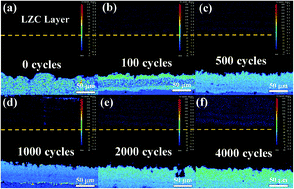A study of crack formation and propagation in LaZrCeO/YSZ thermal barrier coatings at different temperatures†
Abstract
The use of LaZrCeO/YSZ double ceramic layer (DCL) thermal barrier coatings (TBCs) has drawn increasing attention in gas turbine engines, even though their thermal shock lifetime and failure still remain a challenge. This work focuses on diffusion, crack formation and propagation in TBCs at different thermal shock temperatures. The materials were characterized using methods such as X-ray diffraction, electron probe micro-analysis, scanning electron microscopy and transmission electron microscopy. The results reveal that LaZrCeO/YSZ exhibits good thermal shock life at both 1100 and 1300 °C. Broken regions occur on horizontal and vertical cracks at 1100 °C, while they mainly occur on horizontal cracks along the coating interface at 1300 °C. The Cr diffusion in the material was investigated in detail and appears to be relevant to the phase change and crack formation and propagation. The evolution of cracks appears to play a critical role in the failure of the material.

- This article is part of the themed collection: 2019 Inorganic Chemistry Frontiers HOT articles


 Please wait while we load your content...
Please wait while we load your content...